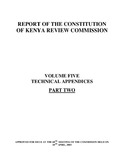| dc.description.abstract | This paper sets out to argue that the family
is the foundation of every society. In this
regard everything should be done to save the
Kenyan family. Family is one of the oldest
and most common human institutions. Since
prehistoric times, the family has been an
important organization in society. Most
people grow up as a family, and as adults
establish a family of their own. Some
traditional African societies had an
Equalitarian System which gave women and
men equal power in the family. Researchers
have not found a truly Matriarchal System in
which the mother headed the family and had
the most power in society. But in most
African cultures the mother was essentially
honored. People regulated themselves by
elaborating rules governing sexual pairing.
These rules were, and remain extremely
diverse, although prohibitions against incest
- sexual relations between close family
members – have been virtually universal.
The incest taboo requires individuals to find
and marry mates from outside their own
family group: There are two general sources
of complexity in family structure. The first
originates in taking more than one spouse.
Some African cultures practiced polyandry,
the system by which one woman takes more
than one husband. The other is Polygyny or
Polygamy where one husband marries more
than one wife.
It further argues that feminism has some
strengths and weaknesses as far as the
African family is concerned. Only the
strong points of feminism should be upheld.
The negative ones should be discarded.
It also argues that there are a number of
strengths of the traditional African family,
which should be incorporated in the Kenya constitution. Again the negative ones
should be one away with. It centres on the
African Womanism as a movement which
encourages the African Women and Men to
evaluate the state of the family now and
decide: “Whither way forward for the
African family: Womanist or Radical
feminism?” It concludes by stating that let
the good values from both feminism and
womanism be carried forward and let the
negative ones be discarded.
The purpose of this paper is to present on
the question of Gender in the African
tradition. The issue to be covered by the
presentation will include among others: The
African understanding of gender, the role of
culture in gender relations, obstacles in the
African traditions that militate against
women’s rights, and incorporating beneficial
African traditional practices on gender in the
constitution. | en |

